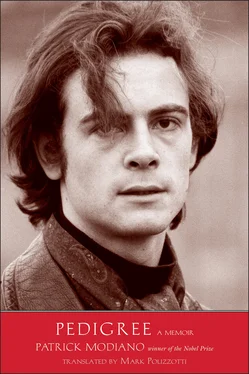My father came only once to visit me in that institution. The headmaster gave me permission to wait for him on the entrance porch. That headmaster had a lovely name: Adonis Delfosse. The silhouette of my father, there, on the porch — but I can’t make out his face, as if his presence in those medieval monastic surroundings seemed unreal. The silhouette of a tall man with no head. I don’t remember if there was a parlor. I think we spoke in a room on the first floor, the library or perhaps the social hall. We were alone, sitting at a table, opposite each other. I accompanied him back down to the porch. He walked away across Place du Panthéon. He’d once told me that he, too, had hung around that part of town when he was eighteen. He had just enough money to buy himself a café au lait and a couple of croissants at the Dupont-Latin, in lieu of a proper meal. In those days, he had a shadow on his lung. I close my eyes and imagine him walking up Boulevard Saint-Michel, among the well-behaved lycée pupils and the students belonging to Action Française. His Latin Quarter was the one of Violette Nozière. He must have run across her many times on the boulevard. Violette, “the pretty schoolgirl from the Lycée Fénelon who raised bats in her desk.”
My father married the ersatz Mylène Demongeot. They lived on the fourth floor, right above my mother. The two floors formed a single apartment, from the time when my parents lived together. In 1962, the two apartments hadn’t yet been separated. Behind a boarded-up doorway, there was still the interior staircase that my father had built in 1947, when he’d begun renting the third floor. The ersatz Mylène Demongeot was not keen on me being a day pupil or continuing to see my father. After I’d spent two months as a boarder, he sent me this letter: “ALBERT RODOLPHE MODIANO 15 QUAI DE CONTI Paris VI. You came up this morning at 9:15 to inform me that you had decided not to return to school as long as I did not reverse my decision to keep you there as a boarder. At around 12:30, you again confirmed the above. Your behavior is beyond disgraceful. If you think that such pathetic attempts at blackmail will win me over, you’ve got another think coming. Therefore I strongly advise you, for your own sake, to go back to school tomorrow morning, with a note for your headmaster excusing your absence due to a cold. I must warn you in no uncertain terms that if you do not, you will regret it. You are seventeen, you are still a minor, I am your father, and I’m responsible for your education. I intend to have a word with your headmaster. Albert Modiano.”
My mother had no money and no theatrical engagements that October of 1962. And my father was threatening to discontinue my child support unless I moved back into the dormitory. Thinking about it today, I can’t imagine I cost him very much: just modest room and board. But I remember seeing him in the late 1950s, so utterly “broke” that he had to borrow the few francs my grandfather sometimes sent me from Belgium out of his retirement pension. I felt closer to him than to my own parents.
I continued to be “on strike” from the boarding school. One afternoon, my mother and I were walking in the Tuileries; we didn’t have a cent. As a last resort, she decided to ask her friend Suzanne Flon for help. We went to Suzanne Flon’s on foot, having not even enough change for two metro tickets. Suzanne Flon welcomed us into her apartment on Avenue George-V with its superposed balconies. It was like being on a cruise ship. We stayed for dinner. In melodramatic tones, my mother laid out our “misfortunes,” her feet planted firmly, with theatrical and peremptory gestures. Suzanne Flon listened indulgently, deploring our situation. She offered to write my father a letter. She gave my mother some money.
Over the following months, my father had to resign himself to my finally leaving the dormitories where I’d lived since age eleven. He made appointments to see me in cafés. And he trotted out his standard grievances against my mother and against me. I could never establish a bond between us. At each meeting, I was reduced to begging him for a fifty-franc bill, which he would give me very grudgingly and which I’d bring home to my mother. On certain days, I brought nothing home, which provoked furious outbursts from her. Soon — around the time I turned eighteen and in the years following — I started trying to find her, on my own, some of those miserable fifty-franc bills bearing the likeness of Jean Racine. But nothing softened the coldness and hostility she had always shown me. I was never able to confide in her or ask her for help of any kind. Sometimes, like a mutt with no pedigree that has too often been left on its own, I feel the childish urge to set down in black and white just what she put me through, with her insensitivity and heartlessness. I keep it to myself. And I forgive her. It’s all so distant now … I remember copying out these words by Léon Bloy at school: “Man has places in his heart which do not yet exist, and into them enters suffering, in order that they may have existence.” But in this case it was suffering for nothing, the kind from which you can’t even fashion a poem.
Our poverty should have brought us closer. One year—1963—they had to “reconnect” the gas mains in the apartment. Work needed to be done, and my mother didn’t have the money to pay for it. Neither did I. We cooked our meals on an alcohol burner. We never put on the heat in the winter. That lack of money would haunt us for a long time. One afternoon in January 1970, we were so hard up that she dragged me to the pawnbroker’s on Rue Pierre-Charron, where I hocked a fountain pen “made of gold with a diamond nib” that Maurice Chevalier had presented to me at a literary awards ceremony. They gave me only two hundred francs for it, which my mother pocketed, steely-eyed.
During all those years, we dreaded due dates. Rents on those old apartments, dilapidated since before the war, weren’t very high at first. Then they started rising around 1966 as the neighborhood changed, along with its shops and residents. Please don’t hold such details against me: they caused me some anxiety at the time. But it soon evaporated, as I believed in miracles and would lose myself in Balzacian dreams of wealth.
After those dismal meetings with my father, we never entered the building together. He would go in first, and I, per his instructions, would have to cool my heels for a while, pacing around the block. He concealed our meetings from the ersatz Mylène Demongeot. Usually I saw him alone. One time, we had lunch with the marquis Philippe de D. and the meal was split between two restaurants, one on the Quai du Louvre and the other on the Quai des Grands-Augustins. My father told me that Philippe de D. was in the habit of lunching at several restaurants at a time, where he kept appointments with different people … He ordered his appetizer in one, his main course in another, and changed restaurants yet again for dessert.
The day when we followed Philippe de D. from the Quai du Louvre to the Quai des Grands-Augustins, he was wearing a kind of military tunic. He claimed to have been a member of the Normandie-Niémen escadrille during the war. My father often spent the weekend at D.’s chateau in the Loire-Atlantique. He even went on duckshoots there, which wasn’t exactly his style. I remember the few days in 1959 that we spent in Sologne, at the home of Paul Bertholle, his wife, and the comte de Nalèche, where I’d been afraid my father would abandon me and those killers would drag me into their blood sport. Just as he’d been “in business” with Paul Bertholle, he was now “in business” with Philippe de D. According to my father, D., in his youth, had been a juvenile delinquent and had even spent time in jail. He later showed me a photo clipped from a back issue of Détective that pictured D. in handcuffs. But D. had recently come into a large inheritance from his grandmother (née de W.) and I imagine my father needed him as an investor. Since the end of the 1950s, he had been pursuing a dream: to buy up shares in a business concern in Colombia. And he was surely counting on Philippe de D. to help him achieve his goal.
Читать дальше












